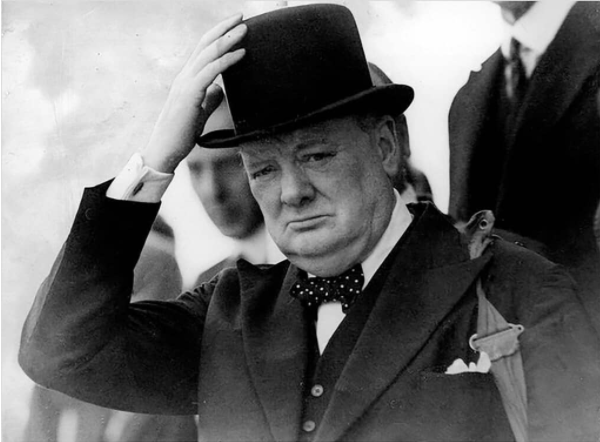We teamed up with the Unknown History podcast on Quick and Dirty Tips to bring you their latest series based on Giles Milton’s Checkmate in Berlin. Episode 7 discusses Winston Churchill’s seminal 1946 speech in Westminster College, which gave not only a name to growing Soviet influence in Central and Eastern Europe, but also foresaw the future of the Iron Curtain.

Image under Creative Common License.
In the first week of March 1946, a gruff, heavy-jowled British gentleman could be seen boarding a train at Silver Spring Station, in Maryland. The gentleman in question was Winston Churchill, leader of His Majesty’s opposition, and he was embarking on a twenty-four-hour overnight journey to Missouri in the Ferdinand Magellan, President Truman’s armored railcar.
Churchill had been invited to make a keynote speech in Truman’s home state and he intended it to be his most important address since losing the 1945 election. He was accompanied on his journey by the American president himself, along with Truman’s twenty-two-year-old daughter, Margaret, and the usual entourage of aides and Secret Servicemen. Also in the party was the president’s close advisor Gen. Harry Vaughan.
Churchill was in ebullient form during the voyage, drinking five large Scotches before the onboard dinner and reciting anecdotes about his youthful skirmishes against the Boers in the parched backlands of Natal.
The two protagonists got along famously and agreed to call each other “Winston” and “Harry.” They played poker into the late hours and watched the darkening plains unfurl into the endless horizons of Indiana and Illinois. At one point, Churchill put down his cards and gushingly expressed his desire to live in the United States, although he swiftly added that he deplored some of its more recent customs. When Truman inquired as to which customs he had in mind, Churchill said, “You stopped drinking with your meals.”
On the following morning, as the train chased the sluggish flow of the Missouri River, Churchill handed his speech to Truman and asked for his opinion. “He told me he thought it was admirable,” wrote Churchill, “and would do nothing but good, though it would make a stir.”
The first stir of that historic day was caused by Churchill himself, and it happened within minutes of his arrival in Fulton. “[His] desire for liquid refreshment became something of a problem, [for] Fulton was a dry town.” So wrote the young Margaret Truman, who was astonished by Churchill’s capacity for alcohol. After a frantic search, General Vaughan managed to find both liquor and ice for the insatiable Winston. “Well, General,” joshed Churchill as he poured himself a generous sharpener, “I am glad to see you. I didn’t know whether I was in Fulton Missouri or Fulton Sahara.”
The speech was due to take place just a few hours after his arrival, in the gymnasium of Westminster College. Although Fulton was an unremarkable midwestern town, Churchill was performing on a world stage, and he dressed to impress his audience, donning the scarlet robes and plush black cap of Oxford University. Thirty thousand locals had flocked to the streets in the hope of glimpsing this near-mythical beast, while the makeshift auditorium was packed to capacity with an expectant crowd. Truman performed the introductory warm-up.
“I understand that Mr. Churchill is going to talk about the sinews of peace,” he said. “I know he will have something constructive to say to the world.” Once the president had finished his introduction, Churchill asked for the lights to be dimmed, plunging the auditorium into a gloomy twilight of giant shadows and snapping flashbulbs. This caused dismay among the assembled press, who could pick out little more than Churchill’s balding scalp. The British Movietone commentator went so far as to apologize to viewers for the curtain of darkness that had fallen over the great auditorium. Yet the dark backdrop served its purpose, for the looming shadows only heightened the drama.
The “World Citizen,” as Truman had called Churchill, made his way to the lectern. He had the air of an aging warship going doggedly into battle, his stooping shoulders like great oak beams, his bones creaking as they sought to support the giant head. Yet the cannon were primed for action, and the old galleon was more than capable of delivering a formidable broadside. As Churchill approached the podium, the three-thousand-strong crowd rose to their feet, clapping, cheering, and shouting their praise.
Churchill flung his foppish cap onto a nearby chair, nudged his tiny spectacles onto the bridge of his nose, and slowly started to speak. “I am glad to come to Westminster College this afternoon,” he began. “The name ‘Westminster’ is somehow familiar to me.”
Gone was the rambling Churchill of the Yalta and Potsdam conferences; gone were the digressions and interminable anecdotes. “It is my duty . . . to state facts as I see them to you, to place before you certain facts about the present position in Europe.”To learn more about the history of World War II, visit Unknown History on Quick and Dirty Tips. Or, you can listen to the podcast below.
